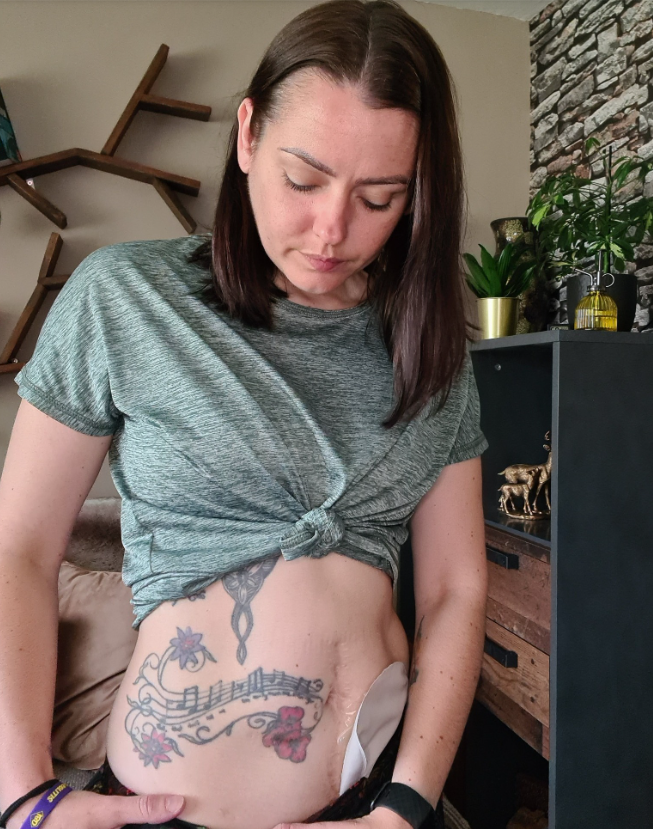
You may know by now that I’ve had more than one stoma throughout my journey. The first, in 2007, was the result of emergency surgery, less than a week after being diagnosed with ulcerative colitis. I did have a partner at the time, but we’d only been together for about five months.
I was struggling to process what was happening because everything had happened so fast. I’d only had symptoms for two weeks before going to A&E, being diagnosed, and within the week I was facing life with an ileostomy. Having never even heard of a stoma before, it was quite the shock.
I’d nearly died, so my partner was just happy to have me alive. There were complications; post-op ileus, C-diff, and sepsis. There was a second surgery to clean everything out, and I was left incredibly weak. I was in the hospital for around six weeks. My mental health took a nosedive.
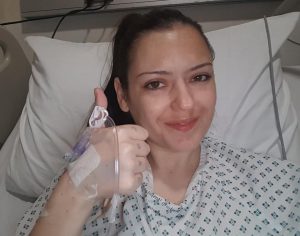
Recovery continued at home. Thankfully, I was still living with my mum at 19 years old.
I told my partner that he should consider leaving. Everything felt too much for me to deal with. I didn’t see why someone else should have to deal with it too. He didn’t leave. Nearly losing my life had made me look at my life differently. I simply felt like life was too short, and just wanted to just get on with things. I moved in with my partner to start a new life when I was back on my feet. However, I still wasn’t sharing anything with him. I was so wrapped up in feeling sorry for myself, I felt like the issue was mine and mine alone. Even when my health started to decline again with ulcerative colitis flaring in my remaining rectum, I didn’t share how I was feeling.
My mental health was still very poor. I was unhappy, and I was nowhere near accepting the stoma. I carried on just trying to pretend it didn’t exist – not really acknowledging it. I was counting the days until I could be rid of it. Only when I saw the surgeon did I find out that a stoma reversal wasn’t simple. I needed to have a J-pouch built out of my small intestine to serve as a replacement rectum.
The surgery carried large infertility risks, and I was advised to start a family pre-surgery. So, that’s what we tried to do. At the time, I didn’t see any other way. Not having children was not an acceptable outcome to me. In hindsight, I see what a poor decision that was. I see how much my mental health impacted my decision.
There was fear and panic. I didn’t stop to look at the health of our relationship. We STILL weren’t communicating! We conceived and then I miscarried. Only then did I begin to see the cracks. Whilst I’d been so wrapped up in me, I’d totally missed the fact that our relationship had become toxic too.
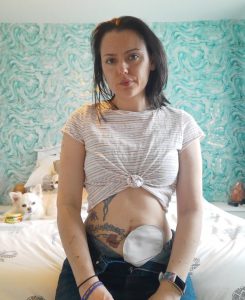
So with toxic thoughts from my own struggle and the toxicity of the relationship I was in, things went from bad to worse, quickly. There was violence, and he also contributed to my negativity about myself and my stoma – telling me that no-one would want me anyway, with my bag and scars. I didn’t have any fight in me, any confidence.
I opted to have the stoma reversed. Constant leaks, burnt skin, and being afraid to leave the house had my quality of life in tatters. Things improved a little for me when the bag had gone. I tried to fall back into the life I’d had pre-diagnosis and surgery, but many friends had fallen away.
Finally, I realised my partner was an alcoholic. I’ve still to this day no idea how I missed it for so long. My dad is an alcoholic, so how did I not see any of the signs? For a time, my attention switched to trying to help and support him, but you can’t help someone who refuses to help themselves.
I believe that had I not been dealing with the health stuff and the stoma, my mental health would never have been so rock bottom, and I’d never have stuck it out for as long as I did. All I can do is learn from that, and I did. I’d learned what I wanted from a relationship, but more importantly, what I didn’t want and what I wouldn’t accept. I would never let anyone make me feel worthless again.
I didn’t want anyone else to go through it either, so I began raising awareness of IBD and supporting people with it. Many of those people were ostomates.
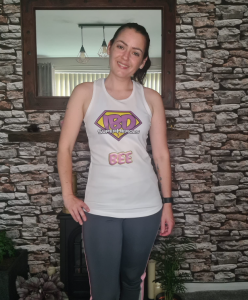
I saw people living and enjoying life with a stoma. I saw the introduction of new supporting products, from underwear to many things designed to prevent leaks being a regular occurrence. More and more stoma bags were invented, and stoma advice became more readily accessible. When my journey began, Facebook wasn’t a thing. I didn’t know anyone with a stoma. The online community taught me that a stoma shouldn’t mean you’re sentenced to misery and isolation.
I dated with my second stoma, and by the time I had the third, I was with my current partner. We’d spent time together whilst I had my second stoma, but nothing happened romantically until I’d had my J-pouch connected back up.
I was honest from the very start that the possibility of me needing a stoma again in the future was pretty high. I had already accepted that. When I realised that time was drawing closer, I’d told him immediately. I tend to just speak when I think. I don’t consider timing, the tone, setting the scene, etc. There wasn’t really any consideration about the best way to approach it because of the position I was already in – sharing my journey and raising awareness online. It was better to tell him first rather than him see it in a post!
I’d shown him bits from the community and shared lots of my own thoughts online. I showed him all of the bag samples and stuff I’d ordered to mentally prepare myself. He was always keen to have a look and a feel. It was funny to see him completely bewildered by some of the bag fastenings.
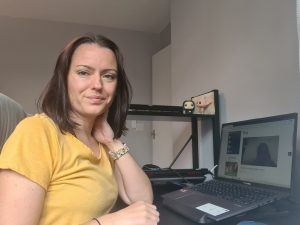
I was very honest when I was hit with a wave of fear at the prospect of a bag for life. He saw me cry my eyes out when my surgery got postponed because my surgeon had an injury. He saw how desperate I was for it, and the state of my health pre-surgery. I think that definitely helped him see the stoma as a good thing.
My situation is obviously not the norm. It’s even very different to my own initial experience – of not wanting to acknowledge it at all!
We have some great new resources from The Intimacy Coach, Charlene Douglas, who partnered with our Fittleworth Clinical Nursing Specialists to create a free relationship programme called Connections, dedicated to supporting anyone who might be struggling to express how they’re feeling – for ostomates, their partners and their families.
Please do check it out for expert practical tips and advice! www.fittleworth.com/connections
If you’ve been affected by any of the subjects raised in this blog, the below organisations offer a broad range of free advice in a safe space for conversation in difficult times.
Crisis support:
The Samaritans
116123
A safe space to talk anytime without judgement
Samaritans.org
Text SHOUT 85258
A free and confidential text service for anyone in crisis
Giveusashout.org
Counselling support:
Counselling Directory
A directory of counsellors in the UK with a wide range of specialisms – including alcohol/drug addiction, OCD and anxiety
counselling-directory.org.uk
We hope you enjoyed this article from our guest blogger. They are expressing their views or knowledge on a topic because of their experience & background. Some of the opinions expressed may not reflect the views of Fittleworth or your NHS professional.
It goes without saying, but this is not clinical advice. Each person will have an individual set of medical factors to consider. So please do not to make significant changes to your diet, exercise or treatments before consulting with an NHS professional.
Sahara was admitted to hospital and diagnosed with Ulcerative Colitis at the age of 19, after just two weeks of being incredibly unwell. One week later, she had emergency surgery to remove her colon and rectum, and had her first ileostomy. A turbulent journey followed; a multitude of treatments, complications, seven surgeries, a failed J-Pouch, and three ileostomies later, she is living with a permanent stoma and is a pro-active IBD and ostomy advocate.

Sahara Fleetwood Beresford – Ostomy Blogger
Sahara joined the online IBD and ostomy community in 2014, and it very quickly became apparent to her that whilst awareness is important, even more important than that is providing support to others as they navigate the stormy waters of life with IBD, or an ostomy.
She runs #IBDSuperHeroes fundraising and awareness campaign, and the Facebook support group. She is a blogger for InflammatortyBowelDisease.net and an IBD Patient Consultant for merakoi – bridging the gap between patients and healthcare. She gets involved with research whenever she can, and is a volunteer for Cure Crohn’s Colitis, where she donates her time and expertise in social media marketing and content creation.
